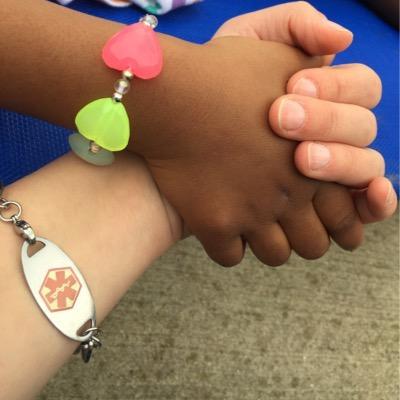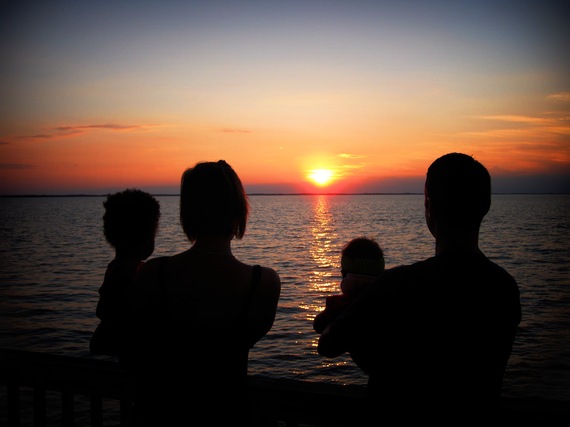Nine years ago, I was delivered life-altering news. After being sick for a year-and-a-half with chronic sinus infections, blurry vision, frequent urination, unquenchable hunger and thirst, unexplained weight loss, depression, bed-wetting, and numbness in my feet, I finally received my answer.
Over my season of problematic symptoms, I had visited five medical professionals. I desperately wanted an answer. One doctor shrugged and suggested, "Anorexia?" Another suggested I should just eat more and gave me a list of high-calorie foods. One doctor even sighed at me after I visited him for nearly the tenth time, begging for an answer. I felt defeated, tired of the constant humiliating comments about my ever-slimming frame. I was in graduate school at the time, teaching multiple sections of composition to freshman, and working a nanny job. I didn't have time to be sick!
The day I was diagnosed is imprinted in my memory. I had (another) medical appointment that morning and came home to take a nap on the couch. I groggily awoke at some point to see that I had several missed phone calls from my husband. I called him, telling him I was so tired and struggling to breathe. He wanted to call an ambulance, but I insisted he let me go back to sleep. Within 20 minutes, he was home and guiding me into the car.
Once we were assigned a room at the hospital, I requested cups of water and warm blankets. I couldn't quench my thirst, and I was shaking from being so cold. I wondered why the nurses weren't giving me oxygen, because I was clearly struggling to catch my breath. I laid helplessly on the bed, my arms extended on either side of me as nurse after nurse rushed in and took blood. The ER ran out of warm blankets, having piled all of them on my shivering body.
Shortly after our arrival, a doctor walked into my room, staring wide-eyed in shock at the clipboard cradled in his arm. He looked up at us and said, "We know why you've been so sick. You have diabetes. We are taking you to the ICU immediately."
Later, I learned I was in a state called Diabetic Ketoacidosis (DKA) in which the body essentially becomes toxic. Being in DKA too long can cause a person to seize, slip into a coma, and die. My diagnosis of type 1 diabetes was the result of my body ceasing to make its own insulin, a hormone that converts food into energy. My A1C (a number that indicates a person's average blood sugar over three months) was 16.9; it was so high that no medical reference chart included it. My blood sugar upon entering the ER was 700, which is seven times the normal level.
In essence, I was dangerously ill. Several nurses later told me I was lucky I didn't die. Going a few more hours without insulin would have killed me.
In the ICU, I was handed glossy diabetes brochures. They angered me, particularly the happy looking individuals on the front cover who posed in front of mountains with sunshine streaming. I knew some of the diabetes basics, and they weren't pretty. My disease has no cure. It's managed by administering insulin by injection or an insulin pump. I would have to test my blood sugar about ten times a day, count every gram of carbohydrate I eat to "cover" it with the calculated amount of insulin, and see specialists, a "diabetes team," including an endocrinologist, podiatrist, and dietitian.
On my third day in the hospital, after spending an evening with a roommate who called all night for her dead husband and tried to pull out her own catheter, I had a meeting with a diabetes nurse educator. The woman had a kind face, her voice full of compassion yet firmness. She talked to my husband and me about the intricacies of type 1 diabetes. Noting my disinterest and gloominess, she changed subjects and asked if we planned on having children.
Steve and I both answered "yes" without hesitation. The nurse smiled, knowing she had finally gotten through to me, and went on to explain what diabetes and pregnancy might look like. But I had stopped listening. A single word had popped into my mind. Despite the confusion, anger, and devastation that had transpired over the past year-and-a-half, and particularly over the past three days, I knew without a doubt that what I heard was something divine, clear, and promising.
This Mother's Day, I celebrated six years of motherhood and nine years with type 1 diabetes. Though my disease is expensive and exhausting, required 24/7/365 management, without it, I wouldn't be mothering my three children. Every high and low blood sugar, every medical appointment, every threatening and possible complication is worth the experience of being a mother.
When I feel sticky hands on my face, when I hear a soft "I love you," when I feel the weight of their bodies on my lap, when I encircle them with my arms and bury my face in their necks, when we have dance parties in the kitchen, when we bake cookies, when we have sweet conversations as I tuck them into bed, I am able to gain just enough strength, inspiration, and determination to face another day with my disease.
The hardest day of my life was also the best day of my life. I was given the greatest opportunity during my darkest moment. To be able to listen to three little ones call me "mom" makes every needle stick, every blood droplet, and every sick day a gift.

